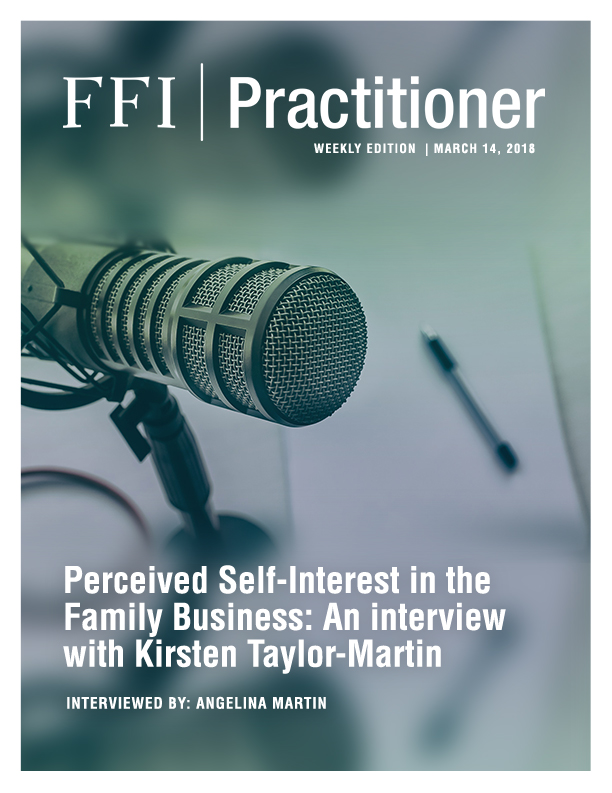Family and Business Interface
Perceived Self-Interest in the Family Business: An interview with Kirsten Taylor-Martin
Weekly Edition • March 14, 2018


From FFI Practitioner
For this week’s FFI Practitioner, we are excited to share an interview with Kirsten Taylor-Martin about a major piece of research recently conducted by Grant Thornton. The interview, which includes useful tips and insights for advisers working with next gen family members, was actually conducted by a next gen member of Kirsten’s family – her daughter, Angelina Martin!

Today I’m speaking with Kirsten Taylor-Martin, accredited family business adviser with Family Business Australia, a member of the Family Firm Institute from which she holds a Certificate in Family Business Advising. Welcome Kirsten.

Thank you, Angelina.
Kirsten, Grant Thornton recently conducted a study on gender diversity in Australia. Why was this topic of interest?
Our focus is working with midsize businesses to develop strategies for growth. We wanted to see whether Australian family businesses are considering gender diversity and diversity of thought as growth strategies.
What did your results show?
What surprised us wasn’t so much the results for today, but the lack of strategy for the future. Sixty-seven percent of respondents had a minority of women in leadership roles and sixteen percent had no women in leadership positions at all. But the key result was that less than two percent of respondents indicated they had targets in place for the future.
Why do you think that is?
The reason is that, firstly, we’re talking about family. Families have histories, and these histories can result in trust issues. Secondly, diversity of thought isn’t considered a growth strategy. So as a result, nothing is in place to change.
Sidebar

Have we lost sight of gender diversity as a growth strategy?
It is clear from our 2017 survey of Australian Family Businesses that a significant number of family businesses see increased gender diversity in leadership as important. Unfortunately, it is equally clear that there are serious limits to what family businesses are prepared to do to make it a reality.
I would have thought that in family business trust would be greater than in commercial businesses. Is that not the case?
It’s interesting, you would think so. But there’s just so much history that can taint the views. Trust is made up of four things: Firstly, credibility — which relates to our words; secondly, responsibility — which relates to our actions; and thirdly, intimacy — which relates to our emotions. All of this can be undone by the fourth item — which is perceived self-interest. If anyone feels you’re putting something forward to get what you want, they won’t trust you. And in families, it’s all the personal issues, often from childhood, that influence perceived self-interest.
Kirsten, what can family businesses do to ensure that their best ideas are considered and prevent them from being discarded as self-interest?
There are three things that family business can work on. Firstly, governance; secondly, being able to develop a strong business case; and thirdly, developing the next gen. If I can explain further. It’s hard in a family business. You often wear hats, and many hats. That is, you have a lot of roles. For example, you might be dad, husband, owner, and CEO. You also have many interactions with your family. You have family dinners. You see them at work. You see them in management meetings, and you see them at family council meetings. Does one ever stop and think which hat am I wearing for this discussion? Or do they just chat and blur all the lines?
Structured governance helps the family in understanding and thinking about the multiple hats they wear and also understanding what should be discussed in which meeting. An idea will be given far more consideration if it’s presented at a manager’s meeting rather than chatting at a family barbecue.
“If anyone feels you’re putting something forward to get what you want, they won’t trust you. And in families, it’s all the personal issues, often from childhood, that influence perceived self-interest.”
Secondly, business case training. It’s about teaching the next gen. Even though it’s dad, if you want your ideal to be given serious consideration, you need to research the idea and you need to present it properly to the board. Proper training and understanding of what a business case is, will go a long way in diverse ideas not being perceived as self-interest.
And lastly, training the next gen. On the job training where dad shows how it’s been done for years is no longer sufficient. Industries are being disrupted, consumers are looking for different experiences. The next gen has to have a development plan that allows them to think differently and think not how the business has been run in the past, but what it needs for the future. If the next gen isn’t developed, we could lose the diverse thinking and instead have clones – and, in many industries clones will not bring growth. Innovation is key to the future, and our next gen have so many ideas.
As advisers we need to ensure family businesses have good governance and know how to put our diverse ideas forward in what form and also how to present a proper business case. As Albert Einstein said, “we can’t solve problems by using the same kind of thinking we used when we created them.”

About the contributors
Angelina Martin is a student at Our Lady of Mercy College in Melbourne, Australia. She is also the daughter of Kirsten Taylor-Martin – a next gen interested in starting her own business.

Kirsten Taylor-Martin, CFBA, is a Chartered Accountant with Grant Thornton Australia and a member of Family Business Australia. Using her extensive experience she helps families develop tailored governance structures to suit their family needs. She can be reached at Kirsten.Taylor-Martin@au.gt.com.
Related Article
If you enjoyed this article, view the related article for a new take on Next Gen leadership and how advisors can help adult children of business owners gain the respect and trust of company employees.

